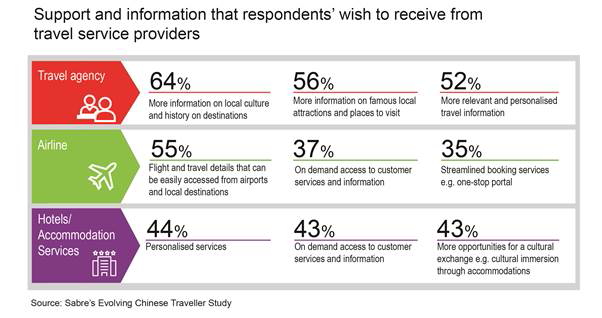|
Sabre has unveiled the results of a new study
which offers insights into the Chinese traveller�s evolving
preferences, and major trends that are shaping China�s booming
travel trade.
Today, nine out of ten Chinese travellers
say they now have the means and are hoping to travel more
frequently as compared to five years ago.
Higher disposable income (20%), enabling
technologies that make travelling more convenient (17%), and
access to relevant travel information (15%) are the top three
factors that have contributed to this increase in travel.
�As China continues to cement its position as
the world�s largest outbound travel market, it�s especially
important that travel service providers and businesses have a
deeper understanding of the Chinese traveller�s evolving
preferences to effectively cater to their needs,� said Alan Chen,
regional director, North Asia, Sabre Travel Network Asia Pacific.
�It is by observing current attitudes and aspirations that we are
able to anticipate and understand the dynamics of the Chinese
market within the broader context of a transforming travel
landscape.�

Today�s new generation of travellers, those
who grew up with the internet, tend to be more demanding when it comes to travel experiences, and are motivated beyond traditional
sightseeing.
The top three motivations for these travellers are to find an outlet where they can relax (25%), have a good time with
friends or family (22%), and seek a better understanding of
foreign cultures (17%).
Looking specifically at the factors that motivate
today�s new generation of travellers, there are two overarching
attitudes toward travelling.
While 49% of the respondents see
travel as a means of personal improvement, over half (51%) of the
respondents say it has become a new form of social currency. For the latter, this means that travel has become a
platform to connect and build stronger emotional bonds (57%), and
a way of enriching their life experiences to share with friends
and family (56%).
China is also entering a new
era of �mass tourism� where travel is increasingly becoming a norm
and an expected experience. As such, more travellers are starting
to pay attention to the quality of travel and are now more
inclined towards personalised travel experiences. Those travellers
seek the flexibility to plan independently so much so that a
majority of respondents (74%) expressed that they are willing to
spend time and energy on their travel plans.
However, having more control
over travel plans does not come at the expense of external support
and trip guidance offered by travel providers and agents. In fact,
many Chinese travellers (78%) still welcome and value support from
friends, relatives and travel service providers.
Three to five years ago, respondents felt that there was a lack of
travel information available to them (60%). Now, nearly half of
the respondents (46%) believe that there are too many travel
options and information available.
With so much
information out there, travellers need support and help from
travel service providers to cut through the clutter and determine
what is useful and relevant for them.
�Technology and the continued
increase in disposable income are driving today�s Chinese travel
industry growth. As traveller motivations and preferences evolve,
there is a great opportunity for the travel industry players to
support and cater to their needs,� said Chen.
The report was completed in collaboration with
Donghua University in January 2017. Results are based on a
quantitative survey of more than 1,000 questionnaires across the
Chinese market, combining market and academic insights.
Videos from/about Sabre include:
Sabre Airline Solutions - Exclusive HD Video
Interview with Dasha Kuksenko,
Philippine Airlines First to Use Sabre's AirVision Commercial Analytics. Exclusive HD videos (9) from Sabre's
Travel Technology
Exchange (TTX)
APAC 2016 including
interviews with:
Wade Jones, Senior Vice President of Marketing and Strategy at
Sabre Travel Network,
Roshan Mendis, Senior Vice President - Sabre Asia Pacific,
Anupam Bokil, Vice President of Product and Technology - Sabre
Travel Network Asia Pacific,
John Samuel, Senior Vice President of Design at Sabre,
Alex
Tang, CEO of XCOR Space Expeditions Asia and
MD of JW Marriott Hotel Beijing and The Ritz-Carlton, Beijing
as well as
Three Presentations from Sabre's Travel Technology Exchange (TTX)
2016 in Beijing and
Brief Introduction to Sabre Airline Solutions by Greg Gilchrist.
Plus we have many more:
HD Videos.
|
Headlines: |
|
See latest
HD Video
Interviews,
Podcasts
and other
news regarding:
Trends,
Sabre.
|
